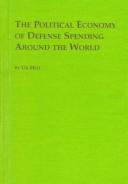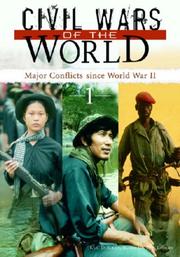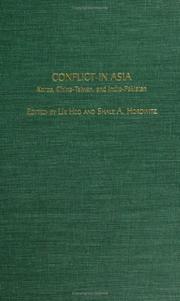| Listing 1 - 8 of 8 |
Sort by
|

ISBN: 077348017X Year: 1999 Publisher: Lewiston, NY : Edwin Mellen Press,
Abstract | Keywords | Export | Availability | Bookmark
 Loading...
Loading...Choose an application
- Reference Manager
- EndNote
- RefWorks (Direct export to RefWorks)
Book
ISBN: 9781107104679 9781316221792 9781107507135 Year: 2018 Publisher: Cambridge Cambridge University Press
Abstract | Keywords | Export | Availability | Bookmark
 Loading...
Loading...Choose an application
- Reference Manager
- EndNote
- RefWorks (Direct export to RefWorks)
In contrast to previous studies of the South Korea-U.S. alliance, the authors analyze the bigger picture, including the history, economics, security, alliance structure, politics, and the future of the alliance. Taking alliance theory as a starting point, the authors argue that the alliance provides an ideal case study to examine how the political development and economic growth of junior partners impact an alliance. As South Korea's capabilities and ambitions have grown, the alliance has evolved from an asymmetric regional security relationship to an economic partnership with global interests, while China's rise and North Korea's nuclear development mean that South Korea remains of strategic importance for American interests in East Asia.
Book
ISBN: 9780521743532 9780511778513 9780521761161 9780511932588 0511932588 9780511931246 0511931247 0511778511 0521761166 0521743532 1107207991 0511852436 1282917420 9786612917424 0511927401 0511924860 0511929900 Year: 2010 Publisher: Cambridge ; New York : Cambridge University Press,
Abstract | Keywords | Export | Availability | Bookmark
 Loading...
Loading...Choose an application
- Reference Manager
- EndNote
- RefWorks (Direct export to RefWorks)
This book examines the changes in politics, economics, society, and foreign policy in South Korea since 1980. Starting with a brief description of its history leading up to 1980, this book deals with South Korea's transition to democracy, the stunning economic development achieved since the 1960s, the 1997 financial crisis, and the economic reforms that followed and concludes with the North Korean nuclear crisis and foreign relations with regional powers. The theoretical framework of this book addresses how democratization affected all of these dimensions of South Korea. For instance, democratization allowed for the more frequent alternation of political elites from conservative to liberal and back to conservative. These elites initiated different policies for dealing with North Korea and held different views on South Korea's role in its alliance with the United States. Consequently, ideological divides in South Korean politics became more stark and the political process more combative.
Democratization --- 321.4 --- 323.3 --- 327.1 --- 331.30 --- KR / South Korea - Zuid Korea - Corée du Sud --- K9180 --- K9300.80 --- K9400.80 --- K9500.80 --- K9549 --- Democratic consolidation --- Democratic transition --- Political science --- New democracies --- History --- Democratie --- Politiek leven. Regeringscoalities en -crisissen --- Buitenlandse politiek. Economische sancties --- Economische toestand --- Korea: History -- post World War II (1945- ) --- Korea: Social sciences -- social and cultural history -- modern period, postwar period (1945- ) --- Korea: Economy and industry -- history -- modern period, postwar period (1945- ) --- Korea: Politics -- history -- modern period, postwar period (1945- ) --- Korea: International politics, law and relations -- North-South relation --- Korea (South) --- USAMGIK --- United States Army Military Government in Korea --- Taehan Minʼguk --- Han guo --- Dae Han Min Kuk --- Tae Han Min Guk --- Daehan-Minʼguk --- South Korea --- Tai Han Min Kook --- South Korean Interim Government --- S.K.I.G. --- SKIG --- Nam Chosŏn Kwado Chŏngbu --- Namjosŏn --- Namjosŏn Kwado Chŏngbu --- Republic of Korea --- Da Han Minguo --- Daehan Min-kuk --- Daikan Minkoku --- ROK --- 대한민국 --- 大韓民國 --- 대한 민국 --- Daehanminguk --- Economic conditions --- Politics and government --- Social Sciences --- Political Science --- Ȯmnȯd Solongos --- Emu̇nedu̇ Solungus --- Solongos (South) --- Solungus (South) --- Bu̇gd Naĭramdakh Solongos Uls --- Bu̇gu̇de Nayiramdaqu Solungus Ulus --- I︠U︡zhnai︠a︡ Korei︠a︡ --- Южная Корея --- Korei︠a︡ (South) --- Корея (South) --- BNSU --- БНСУ
Book
ISBN: 1316221792 1108667058 1108660983 110710467X 1107507138 9781108667050 9781108660983 9781316221792 Year: 2018 Publisher: Cambridge, England : Cambridge University Press,
Abstract | Keywords | Export | Availability | Bookmark
 Loading...
Loading...Choose an application
- Reference Manager
- EndNote
- RefWorks (Direct export to RefWorks)
In contrast to previous studies of the South Korea-United States alliance, Uk Heo and Terence Roehrig analyze the bigger picture, including the history, economics, security, alliance structure, politics, and the future of the alliance. Taking alliance theory as a starting point, the authors argue that the alliance provides an ideal case study to examine how the political development and economic growth of junior partners impact an alliance. As South Korea's capabilities and ambitions have grown, the alliance has evolved from an asymmetric regional security relationship to an economic partnership with global interests, while China's rise and North Korea's nuclear development mean that South Korea remains of strategic importance for American interests in East Asia. This book will be read both as a major contribution to Korean studies and the study of alliance politics and theory.
National security --- United States --- Korea (South) --- Foreign relations --- Military relations
Book
ISBN: 1139989618 1139984993 051199835X 1107012503 1107690536 Year: 2014 Publisher: Cambridge : Cambridge University Press,
Abstract | Keywords | Export | Availability | Bookmark
 Loading...
Loading...Choose an application
- Reference Manager
- EndNote
- RefWorks (Direct export to RefWorks)
South Korea's phenomenal rise has been studied extensively by political scientists and economists both in terms of its impact on democratisation and as a role model for economic development. Yet little attention has been devoted to exploring the nexus between economic development and foreign policy. In South Korea's Rise, Uk Heo and Terence Roehrig propose a new theoretical framework to illustrate how an increase in a country's economic prosperity can bring about change to its foreign policy, prompting greater involvement in the international system, the transition to democracy, an expanded set of interests and increased tools to pursue its foreign policy goals. As a rising middle power, analysis of South Korea's foreign policy is crucial to our understanding of the power structure and future relations in East Asia. This is essential reading for all students and scholars with an interest in Asia, foreign policy and global economics.
Korea (South) --- USAMGIK --- United States Army Military Government in Korea --- Taehan Minʼguk --- Han guo --- Dae Han Min Kuk --- Tae Han Min Guk --- Daehan-Minʼguk --- South Korea --- Tai Han Min Kook --- South Korean Interim Government --- S.K.I.G. --- SKIG --- Nam Chosŏn Kwado Chŏngbu --- Namjosŏn --- Namjosŏn Kwado Chŏngbu --- Republic of Korea --- Da Han Minguo --- Daehan Min-kuk --- Daikan Minkoku --- ROK --- 대한민국 --- 大韓民國 --- 대한 민국 --- Daehanminguk --- Foreign relations --- Foreign economic relations. --- Economic conditions --- Ȯmnȯd Solongos --- Emu̇nedu̇ Solungus --- Solongos (South) --- Solungus (South) --- Bu̇gd Naĭramdakh Solongos Uls --- Bu̇gu̇de Nayiramdaqu Solungus Ulus --- I︠U︡zhnai︠a︡ Korei︠a︡ --- Южная Корея --- Korei︠a︡ (South) --- Корея (South) --- BNSU --- БНСУ

ISBN: 9781851099191 1851099190 Year: 2007 Publisher: Santa Barbara, Calif. : ABC-CLIO,
Abstract | Keywords | Export | Availability | Bookmark
 Loading...
Loading...Choose an application
- Reference Manager
- EndNote
- RefWorks (Direct export to RefWorks)
Military history, Modern --- Civil war --- Histoire militaire --- Guerre civile --- History --- Histoire --- Guerre civileHistory
Book
ISBN: 0742501329 0742501337 Year: 2001 Publisher: New York : Rowman and Littlefield,
Abstract | Keywords | Export | Availability | Bookmark
 Loading...
Loading...Choose an application
- Reference Manager
- EndNote
- RefWorks (Direct export to RefWorks)
International finance. --- Pressure groups. --- Finances internationales --- Groupes de pression --- Geografie --- Economische geografie --- Ontwikkeling.

ISBN: 027597779X 0275977919 Year: 2002 Publisher: Westport, CT : Praeger,
Abstract | Keywords | Export | Availability | Bookmark
 Loading...
Loading...Choose an application
- Reference Manager
- EndNote
- RefWorks (Direct export to RefWorks)
World politics --- Politique mondiale --- Korea (South) --- Korea (North) --- India --- Pakistan --- China --- Taiwan --- Corée du Sud --- Corée du Nord --- Inde --- Chine --- Foreign relations --- Relations extérieures --- -Colonialism --- Global politics --- International politics --- Political history --- -Korea (North) --- -India --- Taiwan Sheng zheng fu --- Tʻai-wan sheng cheng fu --- Taiwan xing zheng zhang guan gong shu --- Tʻai-wan hsing cheng chang kuan kung shu --- Taiwan Sheng xing zheng zhang guan gong shu --- Tʻai-wan sheng hsing cheng chang kuan kung shu --- Tʻai-wan --- Taĭvan --- Formosa --- Taiwan Sōtokufu --- Government-General of Taiwan --- Taiwan sheng --- Tʻai-wan sheng --- Taiwan Provincial Government --- Taiwan zong du fu --- Tʻai-wan tsung tu fu --- Xiaoliuqiu --- 臺灣 --- 台灣 --- Тайвань --- Tajvan --- Тайуан --- Taĭuan --- Tayiwani --- Taywan --- Taivanas --- Taiwana --- Taihuan --- Тайван --- Dominion of Pakistan --- Bākistān --- Islamic Republic of Pakistan --- Islamskai︠a︡ Respublika Pakistan --- Islami Jamhuriya e Pakistan --- Pākistāna --- پاکِستان --- Islāmī Jumhūrī-ye Pākistān --- باكستان --- Paquistan --- Пакістан --- Ісламская Рэспубліка Пакістан --- Пакистан --- Ислямска република Пакистан --- Isli︠a︡mska republika Pakistan --- Islamische Republik Pakistan --- Eʼeʼaahjí Naakaii Dootłʼizhí Bikéyah --- Pakistani Islamivabariik --- Πακιστάν --- Ισλαμική Δημοκρατία του Πακιστάν --- Islamikē Dēmokratia tou Pakistan --- Indland --- Ḣindiston Respublikasi --- Republic of India --- Bhārata --- Indii︠a︡ --- Indië --- Indien --- Sāthāranarat ʻIndīa --- Yin-tu --- Bharat --- Government of India --- Korean People's Republic --- People's Democratic Republic of Korea --- Koreĭskai︠a︡ Narodno-Demokraticheskai︠a︡ Respublika --- Korea (North Korean Government) --- Democratic People's Republic of Korea --- North Korea --- KNDR --- Chʻao-hsien min chu chu i jen min kung ho kuo --- Koreai Népi Demokratikus Köztársaság --- Korea (Democratic People's Republic) --- K.N.D.R. --- K.R.L.D. --- Korea (People's Democratic Republic) --- Korean People's Democratic Republic --- Chōsen Minshu Shugi Jinmin Kyōwakoku --- Chosŏn Minjujuŭi Inmin Konghwaguk --- KRLD --- Koreańska Republika Ludowo-Demokratyczna --- Kūriyā al-Dīmuqrāṭīyah --- D.P.R.K. --- DPRK --- República Popular Democrática de Corea --- Corea (North) --- North Korean Interim Government --- Chosun Minchu-chui Inmin Konghwa-guk --- Taehan Minʼguk --- Han guo --- Dae Han Min Kuk --- Tae Han Min Guk --- Daehan-Minʼguk --- South Korea --- Tai Han Min Kook --- South Korean Interim Government --- S.K.I.G. --- SKIG --- Nam Chosŏn Kwado Chŏngbu --- Namjosŏn --- Namjosŏn Kwado Chŏngbu --- Republic of Korea --- Da Han Minguo --- Daehan Min-kuk --- Daikan Minkoku --- ROK --- 대한민국 --- 大韓民國 --- 대한 민국 --- Daehanminguk --- Cina --- Kinë --- Cathay --- Chinese National Government --- Chung-kuo kuo min cheng fu --- Republic of China (1912-1949) --- Kuo min cheng fu (China : 1912-1949) --- Chung-hua min kuo (1912-1949) --- Kina (China) --- National Government (1912-1949) --- China (Republic : 1912-1949) --- People's Republic of China --- Chinese People's Republic --- Chung-hua jen min kung ho kuo --- Central People's Government of Communist China --- Chung yang jen min cheng fu --- Chung-hua chung yang jen min kung ho kuo --- Central Government of the People's Republic of China --- Zhonghua Renmin Gongheguo --- Zhong hua ren min gong he guo --- Kitaĭskai︠a︡ Narodnai︠a︡ Respublika --- Činská lidová republika --- RRT --- Republik Rakjat Tiongkok --- KNR --- Kytaĭsʹka Narodna Respublika --- Jumhūriyat al-Ṣīn al-Shaʻbīyah --- RRC --- Kitaĭ --- Kínai Népköztársaság --- Chūka Jinmin Kyōwakoku --- Erets Sin --- Sin --- Sāthāranarat Prachāchon Čhīn --- P.R. China --- PR China --- Chung-kuo --- Zhongguo --- Zhonghuaminguo (1912-1949) --- Zhong guo --- République Populaire de Chine --- República Popular China --- Catay --- VR China --- VRChina --- 中國 --- 中国 --- 中华人民共和国 --- Jhongguó --- Bu̇gu̇de Nayiramdaxu Dundadu Arad Ulus --- Bu̇gu̇de Nayiramdaqu Dumdadu Arad Ulus --- Bu̇gd Naĭramdakh Dundad Ard Uls --- Khi︠a︡tad --- Kitad --- Dumdadu Ulus --- Dumdad Uls --- Думдад Улс --- Kitajska --- -Foreign relations --- -World politics
| Listing 1 - 8 of 8 |
Sort by
|

 Search
Search Feedback
Feedback About UniCat
About UniCat  Help
Help News
News